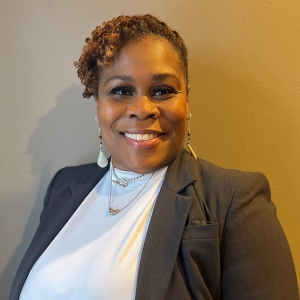 For 13 years, Regina Nadir has worked for the District of Columbia Public Schools — as a school social worker, dean, director of climate and culture, and now as a district-level social worker providing programming for special education students, and working with the families of students at private, religious and nonpublic facilities. In 2021, she began her Doctor of Social Work (DSW) studies at the USC Suzanne Dworak-Peck School of Social Work and was tasked with choosing a subject for her capstone project, the seminal focus of the DSW program connected to the Grand Challenges for Social Work (GCSW).
For 13 years, Regina Nadir has worked for the District of Columbia Public Schools — as a school social worker, dean, director of climate and culture, and now as a district-level social worker providing programming for special education students, and working with the families of students at private, religious and nonpublic facilities. In 2021, she began her Doctor of Social Work (DSW) studies at the USC Suzanne Dworak-Peck School of Social Work and was tasked with choosing a subject for her capstone project, the seminal focus of the DSW program connected to the Grand Challenges for Social Work (GCSW).
Nadir thought about her previous work at Frank W. Ballou Senior High School in Washington, D.C., an underresourced school where a large percentage of students were categorized as “at risk.” She helped many young people who were severely impacted by educational inequity.
“I did a lot of work with this population in that area, in that school,” Nadir said. “They were my heart. Families and students continue to contact me to this day.”
Nadir chose the Grand Challenge to Achieve Equal Opportunity and Justice for her capstone, specifically focusing on the educational system. Her project, entitled “Impact of Positive Student-Staff Relationships and the Social-Emotional Outcomes of Black High School Students Classified with an Emotional Disturbance, Pieces of a Rose Project Summary,” was born out of her rich experience and perspective. It expands on her passion to support the needs of students by helping those who work with youth to create meaningful connections.
Now, Nadir is an award-winning scholar, selected as a 2024 GCSW Doctoral Fellow for her capstone project from a competitive group of applicants. The GCSW award provides each doctoral candidate with a mentorship program and stipend to support research that will connect their project to the people and communities they are studying.
“It is exciting that other people see my vision and how I will be able to achieve equal opportunity and justice in schools,” Nadir said.
Pieces of a Rose Project
Taking inspiration from rapper/poet Tupac Shakur’s poem “The Rose That Grew From Concrete,” Nadir structured and titled her capstone to address the young people who come into the educational system with emotional issues.
“These kids are all over the place, they are puzzle pieces,” Nadir said. “In the end, we get this great work of art if we just put in the time and have enough patience to help them put the pieces back together.”
Through her project, Nadir will build an online program to help educational staff understand what it means to engage with young people in the school system, particularly those students classified with an emotional disability.
“Many professionals have a hard time working with young people who present with emotional issues, or what they consider severe behavioral issues,” Nadir explained. “There is a mindset among those who work in the system of ‘well, I made it, so why can’t they?’”
Typically, a staff worker is given two weeks of training and a file filled with students’ incident reports and functional behavioral assessments — the only narrative they are provided on the background of the student. Nadir’s experience shows that teachers and staff need to focus on getting to know the student on their own terms, for who they truly are, before reading a report about them.
“The goal is for staff to have some tools and strategies so their mindsets are open and not tainted,” Nadir said.
Nadir is often reminded of the young people she served at Ballou High School, where she was asked to create programs that would help build relationships between teachers, students and families. All 4’11” of Nadir was determined to work with kids in a new way. She witnessed the impact that positive student and staff relationships had on the social-emotional outcomes of the students, including an increase in the graduation rate and eventual employment.
The goal of Nadir’s capstone project is to provide teachers and staff with tools they can use, and then continue to support them throughout the school year. The program will help them navigate how to build positive bonds with students who have an emotional disability.
“That’s my little piece of the puzzle for right now,” Nadir said. “To make things a little bit more equitable for these young people.”
To reference the work of our faculty online, we ask that you directly quote their work where possible and attribute it to “FACULTY NAME, a professor in the USC Suzanne Dworak-Peck School of Social Work” (LINK: https://dworakpeck.usc.edu)


